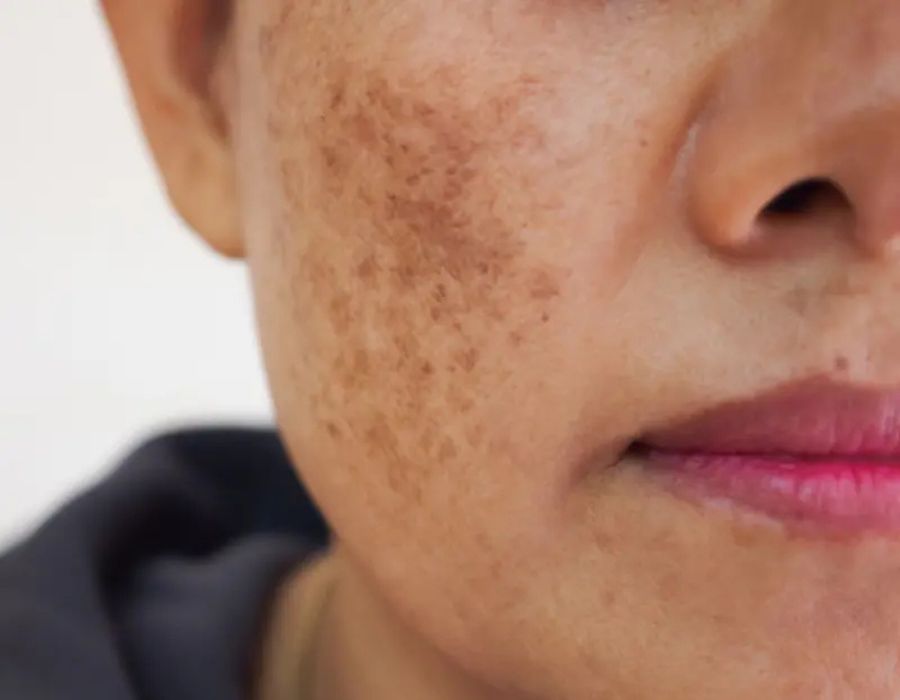Melasma is a common skin condition that appears as dark patches, often on the face. It can affect anyone, but it’s more common in people with darker skin tones. Living in sunny places like Abu Dhabi can worsen melasma, as sun exposure is one of the primary causes. This guide will explore melasma’s causes, offer prevention tips, and dive into ways to manage it from within naturally and medically.
What is Melasma?
Melasma, also known as the “mask of pregnancy,” occurs when patches of skin become darker due to increased pigment. It’s often seen on the cheeks, forehead, and chin but can also affect other sun-exposed areas. While melasma is not harmful, it can affect self-confidence.
Causes of Melasma
- Sun Exposure: UV rays can trigger and worsen melasma.
- Hormonal Changes: Pregnancy, birth control, and hormone therapies can lead to melasma.
- Genetics: Melasma may run in families, making some people more prone.
- Stress: Stress hormones can impact the skin, potentially worsening melasma.
- Skincare Products: Certain products can make skin more sensitive to sunlight, increasing melasma risks.
Tips to Prevent Melasma
- Apply Sunscreen Regularly: Use a broad-spectrum SPF 30+ sunscreen, even on cloudy days.
- Wear Protective Clothing: Hats and sunglasses can shield your face from harmful UV rays.
- Limit Sun Exposure: Seek shade whenever possible and avoid direct sunlight during peak hours.
- Choose Gentle Skincare Products: Avoid products with harsh chemicals that can irritate the skin.
Top Natural Methods for Melasma Relief
Many believe in managing melasma through internal, natural methods, focusing on diet, vitamins, and lifestyle.
- Stay Hydrated: Drinking enough water helps flush out toxins.
- Balance Your Diet: Consume antioxidant-rich foods like berries, leafy greens, and nuts.
- Include Anti-Inflammatory Foods: Foods like turmeric and ginger can reduce skin inflammation.
- Vitamins and Minerals: Vitamin C, E, and B-complex vitamins support skin health.
- Reduce Stress: Practice mindfulness or yoga, as stress can worsen melasma.
Melasma Medical Treatments
Professional treatments can help with persistent melasma. Dr. Aiza Jamil offers personalized melasma treatments in Abu Dhabi.
- Topical Creams: Hydroquinone, tretinoin, and other creams lighten melasma patches.
- Chemical Peels: A chemical peel removes the top layer of skin, reducing melasma.
- Laser Therapy: Laser treatments target pigment, breaking it down and lightening the skin.
- Microneedling: Microneedling treatment boosts collagen production, helping to reduce melasma.
Why Choose Dr. Aiza Jamil for Melasma in Abu Dhabi?
Dr. Aiza Jamil specializes in treating skin conditions like melasma, using a holistic approach tailored to each patient. With her experience, she offers safe, effective treatment options, making her a top choice for melasma care in Abu Dhabi.
Frequently Asked Questions (FAQs)
Is Melasma Curable?
Melasma can be managed effectively with consistent treatment, but it may not be fully curable for everyone.
How Can I Cure Melasma from the Inside?
Melasma is primarily influenced by factors like hormones and sun exposure. While there’s no "cure" from the inside, adopting a balanced diet rich in antioxidants, staying hydrated, and managing hormonal fluctuations through medical guidance may help improve melasma over time. This approach supports skin health from within, potentially reducing flare-ups and enhancing topical treatments’ effectiveness.
Can Melasma be Treated at Home?
Some natural remedies and prevention strategies can help manage melasma at home, though severe cases may require professional treatments.
How Long Does it Take for Melasma to Go Away?
It varies. Some people see improvements within a few months, while others may take longer.
What is the Fastest Way to Cure Melasma?
Combining medical treatments like topical creams with preventive measures can speed up results.
How is Diet Related to Melasma?
A nutrient-rich diet supports skin health, which can help reduce melasma's appearance.
Which Vitamin Deficiency Causes Melasma?
Vitamin B12 deficiency has been linked to skin pigmentation issues, but more research is needed.
Foods to Avoid for Melasma?
Avoid sugar, fried foods, and processed items, as they may increase inflammation.
What to Drink to Reduce Melasma?
Water, green tea, and fresh juices with antioxidants can support skin health.
What Sunscreen Should Melasma Patients Use?
Use a broad-spectrum SPF 30+ sunscreen daily for effective melasma protection.

